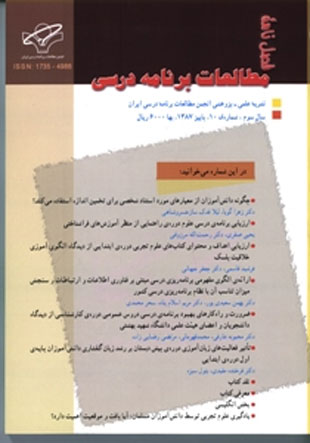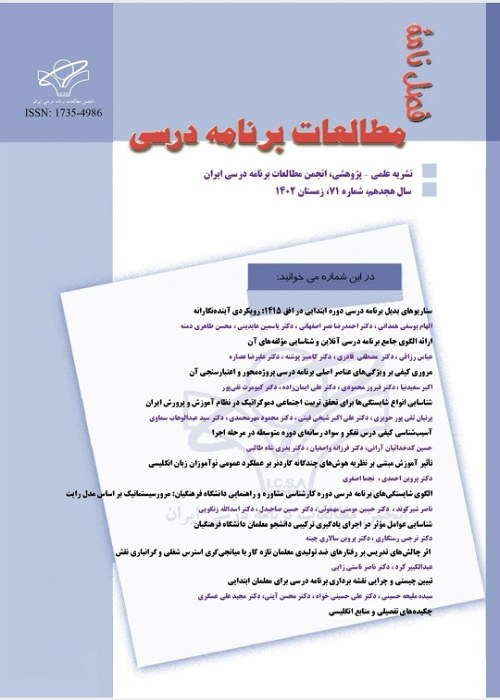فهرست مطالب

فصلنامه مطالعات برنامه درسی
پیاپی 10 (پاییز 1387)
- تاریخ انتشار: 1387/08/11
- تعداد عناوین: 8
-
صفحه 154
-
صفحه 159
-
Page 1In the first phase of this study, a framework was initially developed to explore the place of measurement in school Mathematics. In the second phase, textbooks of primary and middle schools were examined through content analysis.The analysis indicated that the main focus was on mathematical knowledge related to measurement, standard measurement tools and standard units of measure, whereas little attention was given to nonstandard units of measure, real measurement activities and estimation. On the contrary, individual frames of reference, technology, understandingproportion, and cultural context of measurement, apart from few cases, were ignored.Consequently, in the third phase, individual frames of reference used by students enabling them to estimate, were considered. Finally, a new model was developed to show that how individuals use their frames of reference; a model that suggests a spectrum which at one end, there are physical individual frames of reference and at the other, there are mental individual frames of reference. The findings of this part of the research indicated that students mostly use the physical individual frames of reference over the mental individual frames of reference. They also use their individualframes of reference that are not accurate enough and are not learnt through school mathematics
-
Page 20The purpose of this study was examination of Science course in middle schools in terms of emphasis placed on metacognitive knowledge. A sample of 551 from middle school students in Shiraz was selected using clustered random sampling. Documents examined were all textbooks, teaching guides, and academic objectives of the course. Data werecollected using a questionnaire along with content analysis. Results indicated that the mean of metacognitive knowledge (M=3.82) was higher than that of metacognitive control (M=3.74). A Chi-square analysis showed significant difference between metacognitive and nonmetacognitive factors in the text.
-
Page 39This study was aimed at examining the objectives and content of Sciencetextbooks in primary schools on the basis of the Plesk creativity educationcycle. This research deployed a mixed approach, using both quantitative andqualitative methods. Initially the content of Science textbooks was analyzedusing the Anderson cognitive classification. Results indicated that about 6.5% ofthe objectives fell in the creating process. Further, the content of the textbookswas examined using the Plesk creativity education cycle as well as the Rumitechnique indicating a creative engagement coefficient of less than. 25. Finally,models of creativity education were analyzed.
-
Page 65This study aimed to develop a conceptual model for curriculum development based on ICT. The model was proposed, exploring curriculum development approaches, communication technology and management information systems. As for the accreditation of the model, factor analysis along with interviews with 57 professionals and academics were conducted in order to finalize the model. Factors of the model include objectives, theoretical foundations, compatibility with external environment, evaluation, feedback and position of ICT. Results indicated that factors were either appropriateor rather appropriate as far as the national curriculum development system is concerned. No difference was found between views of professionals and academics confirming the adequacy of the model
-
Page 94This study is concerned with the improvement of general education in the Iranian universities. The main questions addressed in the study include: 1) Are general education courses necessary in undergraduate programs?, and 2) How general education at universities could be improved? A randomly selected sample of 313 students and 66 academics at Shahid Beheshti University participated in the study. Respondents completed a questionnaire including open-ended and close-ended questions regardingthe content and structure of general education courses. Results suggest that both academics and students viewed general education courses as necessary while giving priority to content oriented approached to improve the course.
-
Effects of pre-school language programs on development of verbal communication skills of Y1 studentsPage 130This study was aimed at examining the effects of preschool language programs on the development of verbal communication skills of Y1 students. Of a total of 8834 primary school students, a randomly selected sample of 100 students took part in the study. Half of the sample did a preschool program prior to their enrolment at primary school whereas the other half did not. The instrument used for data collection was TOLDP:3. Results indicated that language skills in the group with preschool experience were significantly higher than those of others. No difference was found between boys and girls.


